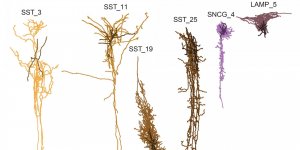Health News

Research conducted at the Butantan Institute seeks to identify a compound that can be used in both the prevention and treatment of arboviruses. »

A new study reveals that using social media induces distinctive physiological effects, including slowed heart rate and increased sweating, suggesting deep mental absorption. »

Study of CB1 receptor has implications for chronic pain treatment. »

The world’s largest study of the impact of dietary polyphenol intake on the risk of cardiometabolic problems tracked more than 6,000 Brazilians for eight years. »

Brazilian researchers have conducted a comprehensive study of the effects of seizures during development. The findings could lead to new treatments for autism, attention deficit disorder, schizophrenia and epilepsy. »

A lung function test used to help diagnose asthma works better in the morning, becoming less reliable throughout the day, Cambridge researchers have found. »

Nursing for at least six months may spur beneficial gut bacteria connected to better heart health years later. »

The conclusion comes from a study that analyzed data from more than 3,600 adolescents aged 14 to 17. Moderate screen time spent on educational activities was associated with less psychological distress. »

A ‘chasm of misunderstanding and miscommunication’ is often experienced between clinicians and patients, leading to autoimmune diseases such as lupus and vasculitis being wrongly diagnosed as psychiatric or psychosomatic conditions, with a profound and lasting impact on patients, researchers have found. »

Scientists have uncovered the mechanism behind how aspirin could reduce the metastasis of some cancers by stimulating the immune system. »

Fish oil supplementation altered the profile of defense cells, which switched from a pro-inflammatory to an anti-inflammatory state, reversing a condition similar to type 2 diabetes. »

A compound found in cruciferous vegetables, including broccoli and Brussels sprouts, may help lower blood sugar levels, offering a potential low-cost method to prevent type 2 diabetes, researchers say. »

It is similar to the one that causes Middle East Respiratory Syndrome »

Researchers at the University of Michigan have identified how mitochondrial dysfunction impairs insulin-producing pancreatic β-cells in diabetes, but findings suggest that reversing the damage could restore their function. »

Researchers have developed comfortable, washable ‘smart pyjamas’ that can monitor sleep disorders such as sleep apnoea at home, without the need for sticky patches, cumbersome equipment or a visit to a specialist sleep clinic. »

NIH trial informs potential treatment strategy for kids who already tolerate half a peanut or more. »

Influenza A virus particles strategically adapt their shape—to become either spheres or larger filaments—to favor their ability to infect cells depending on environmental conditions. »

Scientists have created the most detailed map to date of the human hypothalamus, a crucial brain region that regulates body weight, appetite, sleep, and stress. »

A new study estimates that sugar-sweetened beverages contribute to 2.2 million new cases of type 2 diabetes and 1.2 million new cases of cardiovascular disease globally each year. »

Interactions with friends and family may keep us healthy because they boost our immune system and reduce our risk of diseases such as heart disease, stroke and type 2 diabetes, new research suggests. »

Antibiotics, antivirals, vaccinations and anti-inflammatory medication are associated with reduced risk of dementia, according to new research that looked at health data from over 130 million individuals. »

When young adults start working, the amount of daily physical activity they do increases sharply, only to fall away again over the next few years, while the amount of sleep they get falls slightly, according to new research led by scientists at the University of Cambridge. »

Scientists are raising concerns that the rise in ultra-processed foods may contribute to changes in jaw development, a shift potentially tied to softer diets and reduced chewing. »

A new study has found that the composition of your gut microbiome helps predict how likely you are to succumb to potentially life-threatening infection with Klebsiella pneumoniae, E.coli and other bugs - and it may be altered by changing your diet. »

Based on new brain mapping research funded by the National Institutes of Health (NIH), scientists have discovered that not all cell types in the brain age in the same way. »

Artificial intelligence tools are revolutionizing cancer detection, providing pathologists with enhanced accuracy in screening and improving treatment outcomes. »

Stanford University researchers have engineered a topical, needle-free vaccine using a harmless skin bacterium that could replace traditional injections, offering a pain-free alternative without inflammation or side effects. »

A large study found that greater exposure to long-term air pollution was linked with increased risks for blood clots that can occur in deep veins, which, if untreated, can block blood flow and cause serious complications, even death. »

Findings could pave the way for more personalized treatments for cardiovascular disease. »

Cambridge scientists have developed a urine test for early detection of lung cancer. The test, the first of its kind, detects ‘zombie’ cells that could indicate the first signs of the disease. »

Men with obesity face an earlier onset of cognitive decline compared to women, a study by Imperial College London reveals, underscoring the role of cardiovascular health in dementia risk. »

Scientists say the findings might shed light on the link between loneliness and mental health conditions such as anxiety disorders, which are on the rise in young people. »

Talking therapies and physical rehabilitation may offer effective treatment for long COVID symptoms, according to a groundbreaking Canadian study. »

A drug commonly used to treat glaucoma has been shown in zebrafish and mice to protect against the build-up in the brain of the protein tau, which causes various forms of dementia and is implicated in Alzheimer’s disease. »

A type of therapy that involves applying a magnetic field to both sides of the brain has been shown to be effective at rapidly treating depression in patients for whom standard treatments have been ineffective. »

A new study from researchers at Switzerland’s École Polytechnique Fédérale de Lausanne (EPFL) has highlighted the potential health risks posed by the chemicals in popular personal care products, which can generate harmful pollutants when used indoors. »

Our risk of developing atherosclerosis – ‘furring’ of the arteries – can begin much earlier in life than was previously thought, highlighting the need to keep cholesterol levels low even when we are young, new research has discovered. »

Alzheimer’s disease may damage the brain in two distinct phases, based on new research using sophisticated brain mapping tools. »

A new study has uncovered significant genetic links between Alzheimer’s disease and coronary artery disease, suggesting shared biological pathways that could provide insight into both conditions. »

New research reveals that night owls have a higher body mass index (BMI), larger waists, and a nearly 50% increased risk of developing type 2 diabetes compared to early risers. »

Around one in four patients with severe brain injury who cannot move or speak – because they are in a prolonged coma, vegetative or minimally conscious state – is still able to perform complex mental tasks. »

A study in mice has found that the bacteria Bifidobacterium breve in the mother’s gut during pregnancy supports healthy brain development in the fetus. »

A 2024 study indicates that the consumption of the seaweed Ecklonia cava could potentially slow down or prevent Parkinson's disease, offering hope for new dietary approaches to managing the condition. »

Meat consumption, particularly consumption of processed meat and unprocessed red meat, is associated with a higher type 2 diabetes risk, an analysis of data from almost two million participants has found. »

Study suggests checking for metabolite pattern at birth could provide means to estimate SIDS risk. »

A new study indicates that up to 12.8% of individuals diagnosed with dementia might actually be suffering from cognitive symptoms caused by hepatic encephalopathy, a treatable condition related to liver cirrhosis »

Measuring inflammation and lipids in midlife may support earlier detection, treatment. »

New research shows the actual shape-changing sequence that allows coronavirus proteins to fuse with human cells. »

A new study suggests that while plant-based diets can benefit those at risk of heart disease, the addition of extra virgin olive oil (EVOO) may influence cholesterol levels in unexpected ways. »

Researchers at the National Institutes of Health’s Clinical Center and the National Heart, Lung and Blood Institute have developed and tested a new imaging method that will allow specific detection of Aspergillus fumigatus fungal infections in a timely manner in the future, without the need for invasive procedures. »
